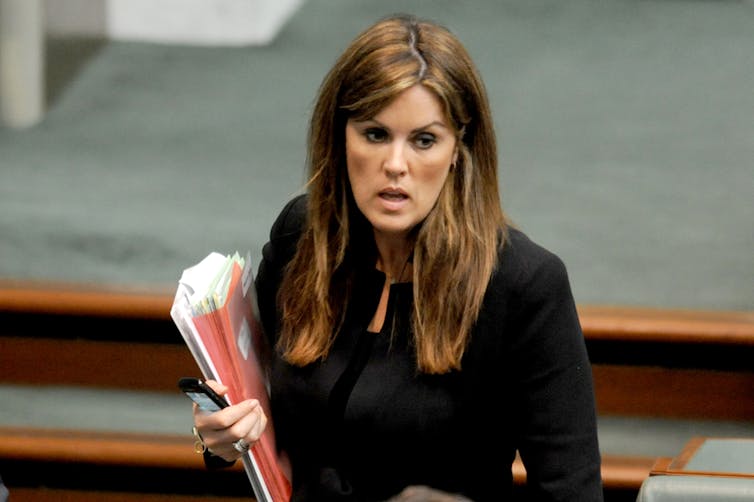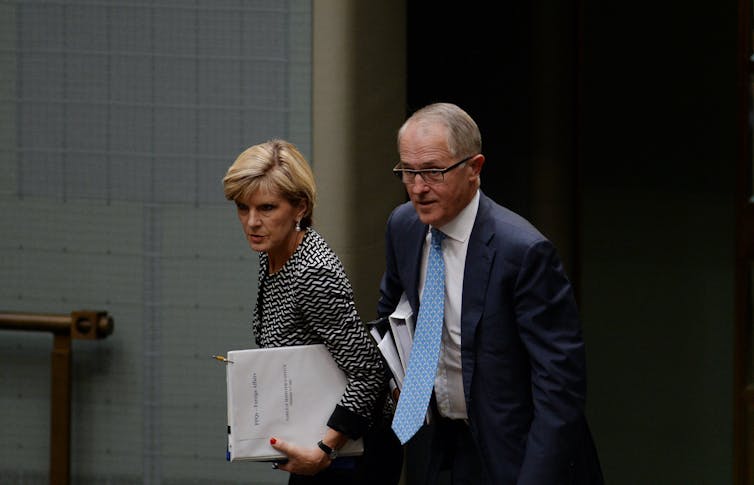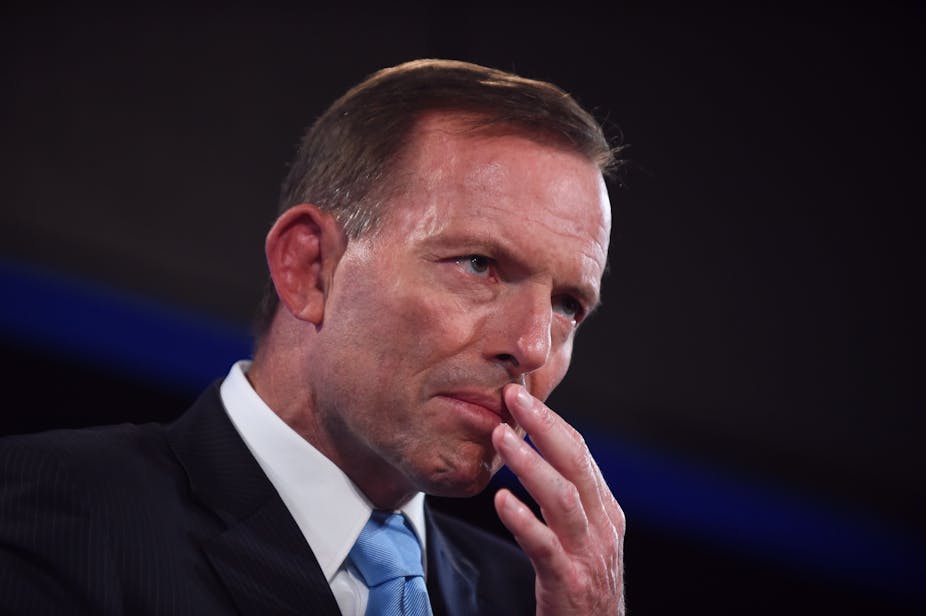Update: Tony Abbott has won the leadership ballot 61-39. For the latest updates follow Michelle Grattan’s articles here.
After his triumph in September 2013, Australian prime minister Tony Abbott faces an extraordinary revolt in his Liberal party, with two backbenchers calling for a ballot for the positions of leader and deputy, and a vote now scheduled for Monday Australian time.
The Liberal crisis is a bizarre rerun of the leadership instability under the former Australian Labor Party (ALP) government, which saw the political assassination of two prime ministers: Julia Gillard replaced Kevin Rudd in 2010 and Rudd overthrew her in 2013.
That there should be a “bottom up” backbench revolt against the leader less than halfway through his first parliamentary term is the more ironic because the Liberal campaign against Labor heavily featured the promise of more stability. The conventional wisdom was that Abbott, though never popular with voters, would be protected by the memory of the Labor years.
Abbott is now arguing to his colleagues “the last thing anyone wants is to see a government in this country turn into some kind of Game of Thrones”.
Why is Abbott being challenged?
Abbott’s vulnerability comes from a range of problems, substantially self-made. A disastrous first budget, brought down by Treasurer Joe Hockey, hit ordinary voters, with plans for a payment on visits to the doctor; the prospect of higher fees from deregulating universities; and a welfare crackdown that would slow pension increases and eventually raise the pension age to 70.
The harshness shocked people. But the government doesn’t control the senate, Australia’s powerful upper house, so many of the budget measures remain in limbo, the arguments around them raging on.
Abbott has also forfeited trust, after making Gillard’s breach of trust (saying she would not bring in a carbon tax and then doing so) a huge issue. On the eve of the election Abbott said there would be “no cuts to education, no cuts to health, no change to pensions, no change to the GST and no cuts to the ABC or SBS”. He broke all those undertakings, except the one relating to the GST, and he made things worse by initially trying to deny he’d breached promises.
The government’s polls plummeted; Abbott’s popularity hit rock bottom. In the a poll this month his disapproval was 67%.
His stubborn and capricious style has alienated the public and his backbench. He took to two elections an expensive proposal for a paid parental leave scheme: despite the plan flying in the face of his emphasis on tackling Australia’s “debt and deficit” and despite it being deeply unpopular with his colleagues, he refused to drop the plan until a week ago, when he was desperately trying to shore up his leadership.

Another irritant has been the “command and control” approach of the Prime Minister’s Office under controversial chief of staff Peta Credlin. Credlin herself has become a major issue: she is an excessively tough “gatekeeper”; critics are appalled at her enormous influence with Abbott; tensions have flared between her and deputy Liberal leader Julie Bishop. Even Rupert Murdoch (via Twitter) has said she should go.
But Abbott has stuck with her, although she is now trying to be less visible and word has gone out that the Prime Minister’s Office will interfere less in ministerial staffing and travel.
Two matches ignited the immediate leadership fire. Abbott’s decision to knight Prince Philip on Australia Day (he’d brought back knights and dames last year) made him a laughing stock.
Then days later the Liberal National Party state government in Queensland, which had held a massive majority, was routed. Under its premier Campbell Newman, the state government had shown similar traits to the national one, including arrogance. The dangers looming for federal marginal seats were stark.
A number of backbenchers started public stirring. Two from Western Australia put forward the motion for the leadership to be declared open, which is known as a “spill” in Australia.
How does a spill work?
Abbott has confirmed there will be a secret ballot in the Liberal party room. The Liberal leader is chosen by the MPs alone – there is no input from the wider party membership. Nor from the Nationals - the rural-based party that is in coalition with the Liberals (although the agreement between the parties would have to be renewed under a fresh leader).
A secret ballot helps Abbott’s opponents, giving some MPs “cover” for voting to open the leadership. Ministers – many of whom have publicly come out in support of Abbott – would by convention be expected to vote against what is a motion of no confidence in the prime minister. But who would know in a secret ballot?
If a spill were carried, there would then be another vote for leader and deputy.
If the spill motion were lost much would depend on the margin, in terms of the the result’s implications. A vote of, say, one third against Abbott would be a clear signal for another attack later.
Who might challenge?
The alternatives to Abbott, in the event of the leadership being thrown open, have narrowed to Communications Minister Malcolm Turnbull and Julie Bishop, who is Foreign Minister and deputy party leader. It is assumed Abbott would fight on and run.
Turnbull, a former opposition leader who was defeated by Abbott for party leadership in opposition by a mere one vote, is charismatic and popular, although more so with Labor voters than Liberal supporters. Like Abbott, he won a Rhodes scholarship and graduated from Oxford. He is a self-made multi-millionaire from a business career in investment banking who co-founded a number of companies.
He won public attention in the 1980s with his successful appearance in the Spycatcher trial (in which the British government lost its attempt to ban a book by a former MI5 officer); he was also a high profile leader of the unsuccessful push for an Australian republic in 1999.
A poll last week found that that when people were asked how they’d vote if Turnbull were Liberal Party leader, the Coalition was ahead 54-46%, compared with trailing 45-55% under Abbott.

But some Liberals remember Turnbull’s abrasive leadership style. The conservative wing of the party is concerned about his progressive position on climate change. Significantly, in the past few days he has said he doesn’t favour any alteration to the present “direct action” policy (which he rubbished in the past), in the absence of major international developments.
Bishop has not indicated whether she would run in a leadership contest. Those close to her say she is consulting colleagues. But publicly this is being cast as an Abbott-Turnbull battle. Turnbull has been publicly silent about his intentions.
Bishop has held her deputy position, included in the spill motion, in opposition and government, since 2007 and under three leaders. She has made clear her support for Abbott relates specifically to resisting the spill motion, not committing herself beyond that. “I support the leader. This is the role of the deputy.”
If Abbott survives, many in the party believe he will be toppled some time later, in a two-stage operation.
Obvious pressure points ahead would be a bad result in the March New South Wales election (Abbott’s home state), an unfavourable response to the coming May budget (which the prime minister has indicated won’t be as harsh as last year’s) and continuing disastrous opinion polls.
What does this mean for the 2016 election?
There is now a widespread expectation that without a leadership change and despite its healthy majority, the coalition could easily become a one-term government. If Turnbull became leader, the chances would probably be improved – but that would depend on whether he overcame some of the leadership limitations he displayed previously.
The Labor opposition under former union leader Bill Shorten has had an easy run because of the Abbott government’s unpopularity. Shorten has been ahead of Abbott as preferred prime minister but, with no alternative policy blueprint out yet, he has yet to establish himself as a strongly credible prime minister-in-waiting. Labor fears a move to Turnbull because he would attract some soft ALP voters. Shorten would come under greater pressure.
Clearly if there were yet another switch of prime minister that would change the game in federal politics. The question would be: how much?
This article was updated to reflect that the leadership ballot has been moved from Tuesday to Monday Australain Eastern Standard Time.

